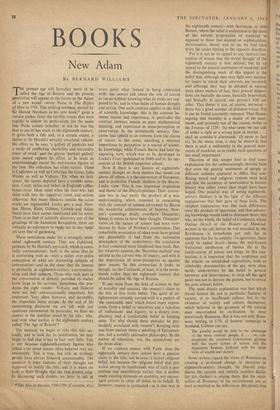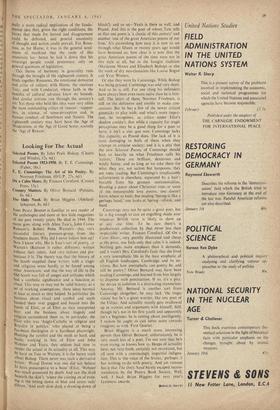BOOKS
New Adam
By BERNARD WILLIAMS gr HE present age will hereafter merit to be
I called the Age of Reason and the present generation will appear to the future as the Adam of a new world'—wrote Paine in The Rights of Man in 1791. This striking sentence, quoted by Sir Harold Nicolson in his new book,* gains a certain pathos from the terrible events that were rapidly' to follow its publication; yet the name that Paine coined (whether or not he was the first to use it) has stuck to the eighteenth century. It gives both a title and, to a certain extent, a theme to Sir Harold's amiably anecdotal volume. He offers us, he says, 'a gallery of portraits and a study of conflicting charkters and successive states of mind,' and the phrase 'portrait gallery'. does indeed capture his effect, as he leads us undemandingly round the well-known figures of the time. His collection has sOme variety. There is Cagliostro as well as Catherine the Great, John Wesley as well as Voltaire. Yet when we look closer, the scenes depicted have a notable same- ness. Court, salon and (when in England) coffee- house recur. Ideas enter when the men who had them walk into the tapestried room, and seldom 'otherwise. Not many thinkers outside the salon world are represented. Locke gets a nod; New- ton, Hume, Kant, Gibbon, Leibniz and Adam Smith have their names mentioned and no more. There is no hint of scientific discovery nor of the grindings of the Industrial Revolution; there are virtually no references to rnpaic nor to any vi,stisl art save that of gardening.-
These restrictions make for a strangely atten- uated eighteenth century. They are explained, perhaps, by Sir Harold's approach, which is essen- tially conversational: both in the sense that he is conversing with us—with a rather over-polite conception of what are interesting subjects of conversation—and in the sense that his interest is primarily in eighteenth-century conversation- alists and their subjects. Those who took part in the conversation or directly provided its matter loom large in his account. Sometimes this pro- duces the right results: Voltaire and Diderot were not only conversationally important, but important. Very often, however, and inevitably, the important items escape. At the' end of his entertaining discourse we are left with our questions unanswered. In particular, we have no answer to the question posed by his title: why, and with what justice, is the eighteenth century called 'The Age of Reason'?
The moment we begin to take this title ser- iously, and to look for its justification, we may begin to feel that it has in fact very little. This is not because eighteenth-century figures who talked a lot about reason often behaved very un- reasonably. This is true, but tells us nothing; people have always behaved unreasonably. The question is what features of their thought are supposed to justify the title, and it is when we look at their thought that the real doubts arise. In discussing such doubts, we have to ask at
THE AOE OF' REASON, 1700-1789. (Constable, 45s.)
every point what 'reason' 'is being contrasted with; one cannot talk about the role of reason in vactto without knowing what its rivals are sup- posed to be, and in what fields of human thought and action. One such contrast applies to the field of scientific knowledge; this is the contrast be- tween reason and experience, in particular the contrast between reason as pure mathematical thinking, and experience as sense-perception or observation. In the seventeenth century, Des- cartes had upheld in an extreme form the claims of reason in this sense, attaching a minimal importance to perception as a source of scienti- fic knowledge; while Francis Bacon had held the opposing view, which was to be developed in Locke's Essay (published in 1690) and by his suc- cessors of the British empirical school.
Now if there is- any feature of eighteenth- century thought on these matters that stands out above all others, it is the conversion of European, and in particular French, thinkers to the Bacon- Locke view. This is one important inspiration and theme of the Encyclopddistes. Their conver- sion was in fact partly the product of a mis- understanding, which consisted in associating with the concept of science advocated by Bacon the wonderful achievements of Newton. New- ton's cosmology finally overthrew Descartes'; hence, it seems to have been thought, Descartes' views on the nature of science had been over- thrown by those of Newton's countrymen. This remarkable association of ideas must have gained any plausibility it had from the nationalist atmosphere of the controversy—the conclusion in fact contained more falsehood than truth. But, for whatever reasons, the 'Baconian method' was saluted as the correct way of inquiry, and with it the importance of sense-perception as against pure reason. 'In this connection it looks as though, on the Continent, at least, it is the seven- teenth rather than the eighteenth century that should be called the Age of Reason.
If one turns from the field of science to that of morality and conduct, the century's claim to the title at first looks better. The spirit of en- lightenment certainly carried with it a pattern of 'the reasonable man' which found many expres- sions, from a belief in toleration and a rejection of 'enthusiasm' and bigotry, to a dreary com- placency and a comfortable belief in keeping calm. Yet why should these attitudes be par- ticularly associated with 'reason'? Keeping calm was from ancient times a teaching of Epicurean- ism, not a notably rationalist philosophy. In the matter, of toleration, too, the connections are far from clear.
If we contrast reason with Faith, then the eighteenth century does indeed have a genuine claim to the title; not because it lacked religious belief, but because the religious belief that pre- vailed among its intellectuals was of such a gen- eralised and unambitious variety that it neither made exacting demands on credulity, nor encour- aged anyone to chop off heads in its behalf. If, however, reason is contrasted—as it also was in the eighteenth century—with Sentiment, or with Nature, where the latter is understood in the sense of the natural propensities of mankind as opposed to those that depend on sophistication, ratiocination, theory and so on, we find once more the scales tipping in the opposite direction.
For it is not by an appeal to any abstract con- ception of reason that the moral thought of the eighteenth century is best defined, but by an appeal to the natural sentiments of mankind; and the distinguishing mark of this appeal is the belief that, although men may fight over particu- lar issues in which their interests are involved, and although they may be deluded in various ways about matters of fact, their general disposi- tions are basically the same, basically benevolent, and basically in accord, one person's with an- other. This theme is not, of course, universal— there was a good number of dissident voices. Yet it can be found constantly repeated. Thus Hume, arguing that morality is a matter of the senti- ments, and precisely not of the reason, writes in his Treatise of 1739: 'In what sense we can talk of either a right or a wrong taste in morals . . . shall be consider'd afterwards.' (It never in fact is.) 'In the mean time, it may be observ'd, that there is such a uniformity in the general senti- ments of mankind, as to render such questions of but small importance.'
Theorists of this temper had to find some explanation for the embarrassingly obvious fads that even the general sentiments of people in different societies appeared to differ, that con- flicting moral and religious systems were held and that the incidence of benevolence in human history was rather lower than might have been hoped. One possible way of seeing eighteenth- century thinkers is in the light of the different explanations that they gave of these feels. The simplest explanation was that such differences were the product of ignorance, and that advanc- ing knowledge would tend to eliminate them; this was, on the whole, the belief of Condorcet, whose Outline Sketch of the History of Mankind, written in his cell before he was executed by the Revolution, is remarkable not only for its optimism but for its nobility. To ignorance, there could be added deceit—hence the well-known Voltairean attribution of human ills to the machinations of priests and kings. In this con- nection, it is important that the scepticism and the attacks on established superstition, both so admirably characteristic of the age, were often tacitly underwritten by the belief in general harmony and benevolence; to strip off the aged paint was not to destroy the picture, but to reveal the pure colours below.
The most drastic explanation was that which traced human ills not to particular features of society, or to insufficient culture, but to the existence of society and culture themselves; which believed in the goodness of ' the natural man uncorrupted by civilisation. So most notoriously Rousseau. But it was not only Rous- seau; writing, in 1776, of Severus' campaign in Scotland, Gibbon can say,
The parallel would be little to the advantage of the more civilised people, if . . . we con- templated the untutored Caledonians glowing with the warm virtues of nature, and the degenerate Romans polluted with the mean vices of wealth and slavery.
Some writers regard the views of Rousseau as creating a profound change in direction in eighteenth-century .thought; Sir Harold (who shares the current and entirely justified dislike for this thinker) is among them. But the simil- arities of Rousseau to his environment are at least as marked as the differences. His theory was
really a more radical application of the funda: mental idea that, given the right conditions, the forces that made for hatred and disagreement Could be defeated, and general unanimity of thought and action could prevail. For Rous- seau, as for Hume, it was in the general senti- ments of mankind that the roots of this unanimity lay—hence he laid it down that his sovereign people could pronounce only on general questions of legislation. • This theme of harmony in generality runs through the thought of the eighteenth century. It binds together Rousseau, the emotional democrat and critic of culture, with Hume, the cautious Tory, and with Condorcet, whose faith in the benefits of cultural advance knew no bounds. And similar notions run through the century's art. Yet those who held this idea were very often the most outstanding critics of 'reason'—suppor- ters, in science, of sense-perception and, in human conduct, of Sentiment and Nature. The eighteenth century may have been the Age of Moderation, or the Age of Good Sense; scarcely the 'Age of Reason.'











































 Previous page
Previous page